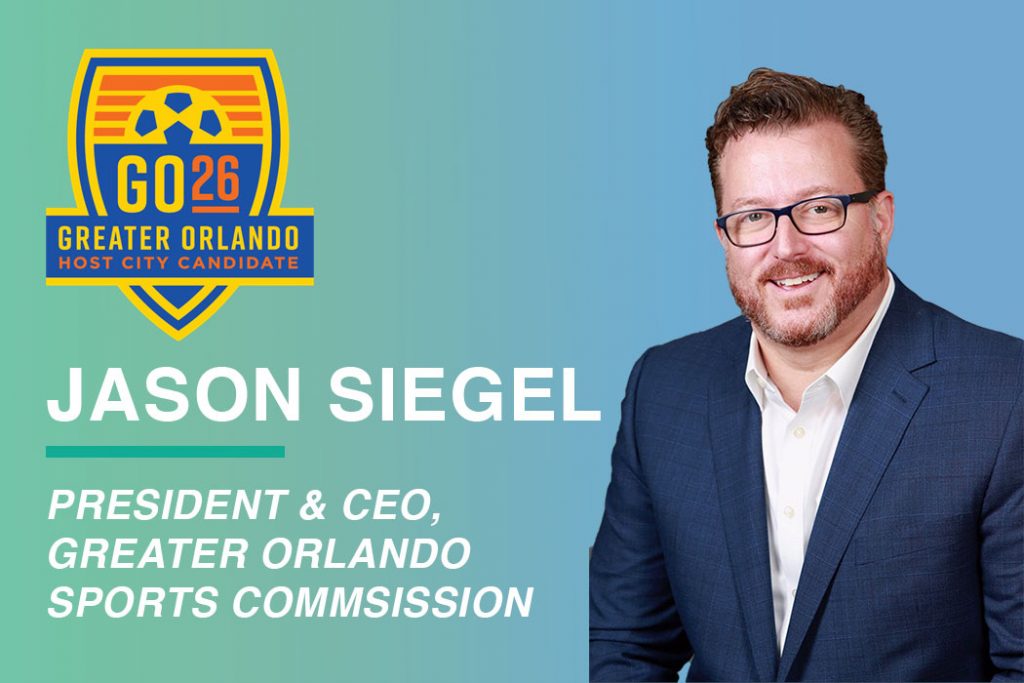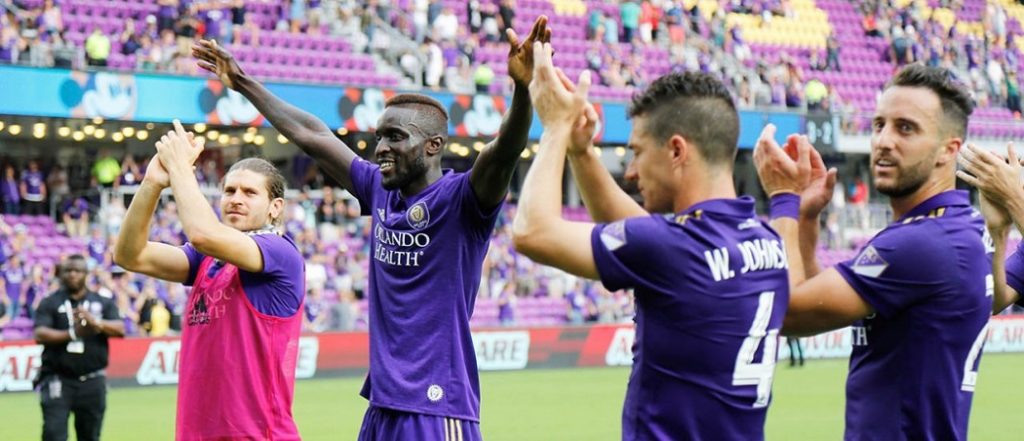“America Has Always Been Soccer’s Great Growth Opportunity – 2026 Is Surely The Moment The Dream Becomes Real.”
March 26, 2021
iSPORTCONNECT’s latest Member Insights piece comes from Jason Siegel, President and Chief Executive of the Greater Orlando Sports Commission. Here, Jason provides a closer look at the legacy of the 1994 FIFA World Cup and why he believes 2026 has the potential to bring in even greater rewards.
I’m often asked why.
Why does Orlando want to host matches of the FIFA 2026 World Cup?
This question takes the conversation towards the ‘L’ word. Legacy.
For every great American city seeking to play their part in 2026, legacy is not one of the questions they face.
It’s the question.
It’s the why.
The “legacy potential” of the forthcoming FIFA World Cup in North America is huge and timely. As we anticipate the 2026 event, we can evaluate what 1994 delivered – and dream of an even more ambitious soccer-inspired agenda beyond 2026.
“America has always been soccer’s great growth opportunity – 2026 is surely the moment the dream becomes real.”
Orlando, as one of 17 hopeful US candidate host cities for 2026 and a favorite venue back in 1994, has had a ringside seat to watch the growing relevance and popularity of the game.
The USA is now a soccer nation, home to 100 million soccer fans. Orlando is now a soccer city.
The change has been immense. And in counting the benefits in purely soccer terms, you cannot divorce North America from the rest of the world. For FIFA and for the game, it is potentially the most lucrative region on earth – the biggest sponsorship, licensed merchandise and media marketplace in the world. America has always been soccer’s great growth opportunity – 2026 is surely the moment the dream becomes real.
Major League Soccer (MLS) is the greatest legacy of 1994. Creating a successful league was the USA’s promise to FIFA when it was awarded the event back then. MLS was founded in 1996 and 25 years on, there is a good story to tell.
MLS has doubled in size since 2009, when there were only 15 teams. There will be 30 franchises by 2022, including in Canada; an increase of 300%. The average MLS club has surged 400% in value since 2008 – Forbes put the average value of an MLS franchise in 2019 at US$312 million.
This picture been mirrored and even amplified in Orlando. March 8, 2015 was a day we will remember forever. 62,510 City fans flooded the Orlando Citrus Bowl for Orlando City’s inaugural MLS match against fellow expansion club New York City FC. The match was the largest ever for a soccer game at the Orlando Citrus Bowl and the second largest opening weekend for a MLS franchise.

Orlando has never been as organized around soccer as we are now. This is across government, the private sector and the grass roots. “Go Orlando” is working seamlessly with a huge network of local organizations to promote soccer tourism and – even during the pandemic – we have done so much to keep the dream alive.
We have helped nurse MLS through a desperate year, creating the environment for a safe resumption of play in the COVID-free Disney-Orlando bubble, thus enabling the League to save revenues through preserving many of its commercial contracts.
At national level too, the US men’s and women’s national teams have maintained their strong connection with the city. The men’s team has played seven matches in Orlando to date, winning the last five in a row, including all four held at our Exploria Stadium. And the women’s national team has had a clean sweep, winning every one of its 17 matches in Orlando. There are more to come.
Everything that has happened in the last few years – from the advent of Orlando City to the opening of the Exploria Stadium in 2017; from the Orlando bubble to the recent staging of the Concacaf Tournament in Orlando and many national team matches, confirms the upward trend for soccer in our area. It’s all part of the legacy of 1994. It’s been a great run.
The future lies with the young. Every sport needs strong grass roots, particularly soccer.
The FIFA World Cup USA 1994™ drove a doubling of youth football participation in America. In Orlando, we believe we are on course to double down again.

As Alex Leitao, CEO of Orlando City Socer Club points out: “Our organization has invested significantly in the Greater Orlando community – Orlando City, Orlando Pride, Orlando City’s Development Academy, Orlando City Youth Soccer, Exploria Stadium, the men’s and women’s training grounds (in Osceola and Seminole Counties, respectively), and our new Youth Soccer Network”.
“Over the same timeline that Orlando City SC has been growing, we believe the youth soccer participation for both boys and girls in Orlando has likely quadrupled.”
Orlando has been developing into a major soccer center for young players. However, this growth has come to a screeching halt in 2020; a disastrous year for kids’ sport.
Orlando has a raft of urgent plans to resume this growth as we work towards 2026. First and foremost, we need to define the size of the problem. We are developing vital Orlando-specific statistics to guide the creation of mechanisms to push back against the decline in sport participation.
GO Sports has been joined by more than 30 regional leaders to participate in a newly formed youth sports task force. The Greater Orlando Youth Sports Survey, supported by Advent Health will be distributed via members of our task force and the results should give us a real picture of what we face at the youth level.
We believe soccer – inexpensive, universal – is the right remedy. Our recent launch of a Youth Soccer Network, will expand the pool of talented young players in the Orlando area and accelerate the uptake of this sport.
We are bringing soccer to under-served communities by providing free soccer programming and investing in safe places to play. To date, Orlando City Youth Foundation has installed nine mini-pitches in under-served areas of Greater Orlando. This will help all kids and, who knows, nurture some of the home-grown stars of tomorrow.
Orlando City Youth is Florida’s leading program for developing players from eight to 18 and the only club in Florida to offer both U.S. Soccer Development Academy program and the ECNL program. 2026 should bring thousands of young people not currently affiliated – including from underserved and immigrant communities – into the ranks as registered players.
So, looking forward, what will be the soccer legacy of 2026? Like a huge, slow-gathering wave, it is already having an effect, long in advance of the opening ceremony.
“Hopefully the excitement and energized atmosphere of the approaching 2026 event will introduce new people, young and old, to soccer.”
2026 is “the second half” for soccer in the USA. It will enable us to fulfil our soccer agenda. It will provide the momentum to bring the sport into under-served communities, as we work with the US Soccer Foundation to inspire participation and teach life skills. To create a sense of community through the sport.
And hopefully the excitement and energized atmosphere of the approaching 2026 event will introduce new people, young and old, to soccer and enable us all to develop that springboard for homegrown talent that will fulfil America’s ambitions as a great soccer nation.
Meanwhile, Orlando will help deliver – as the best host, with the best facilities to stage all levels of soccer competition – the framework for success. Legacy is not just a question – it is the question.


